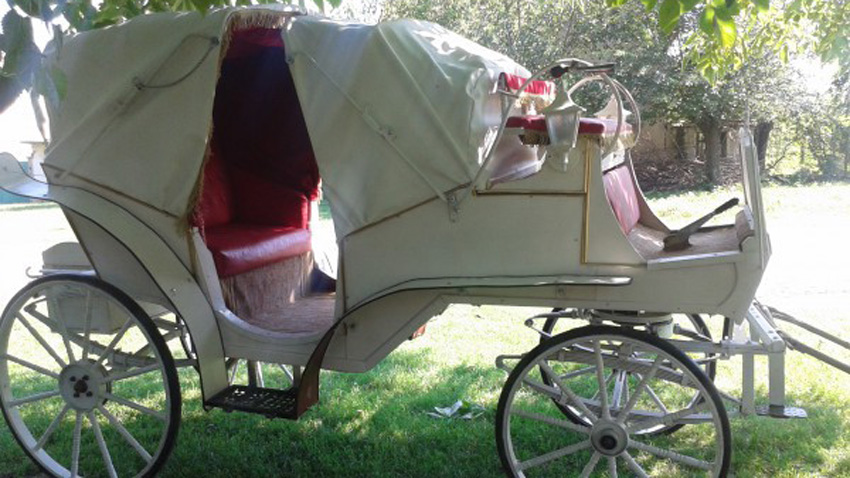A horse is pulling white phaeton and a magnificent princess is riding in it. Childhood dreams come alive and cause new urges in the soul of a natural-born craftsman.
“Take off your hat my friend and bow to Mr. Orozov and hope that more entrepreneurs like him are born in Bulgaria,” Bulgarian writer Aleko Konstantinov once said when he saw the elegant phaetons the self made craftsman masterfully produced.
A century later, a retired teacher decided to revive the craft of making carriages and phaetons. But he is not copying the old models and is following his dream to create a modern vehicle. So, inspired by the skills of the old masters, Krum Petleshki from the village of Rogozen near Vratsa, decided to create an original blend between a carriage and car.
“In a shed I once found an old burned carriage. I restored it and I liked it,” he says. “After that I dreamt about creating my own model - white in color, with some extras such as brakes, lights, original tires, metal spokes, two hoods, which in bad weather turnethe phaeton into a closed carriage. Many people now come to see it and are happy that I could realize my dream.”
24-year-old Mito Orozov, who in 1883 opened a workshop for repairing carriages, also followed his dreams. But it was just a step towards the establishment of his own factory for the production of carriages and phaetons. He hired available carpenters, metal workers and painters but today the contemporary craftsman relies heavily on his hands and in extreme cases resorts to the help of workers and friends from the region of Vratsa.
“I have been dealing with woodworking for a long time and I have taught wood carving. Years ago I cut out of a newspaper an article that read about the carriages made by a craftsman from Northeastern Bulgaria. I saw his models, but did not like their design and decoration much. Then I decided to prove that I can do something better and really proved it - to myself and to the villagers,” Krum Petleshki says.
When one closes their eyes, they see the white carriage on cobbled streets of a town or on a winding forest road next to a murmuring river. An elegant lady and a gentleman are on the bright red seat and he deftly tugs at the reins…

The exquisite carriages of Orozov from the period of post-liberation Bulgaria won the gold medal at an exhibition in London and actually became famous worldwide. Henry Ford offered the Bulgarian to produce the bodies of his cars! But Mito Orozov said he had to be crazy to build coaches for Ford for such a small prize he offered.
In order to get closer to the perfection of the renowned craftsman, Krum Petleshki has paid a number of visits to the Museum of Carriages in Vratsa to examine closely every detail of the old-time vehicles. When producing his carriages, he decorates them with roses. From time to time he takes the phaeton to his village, borrows horses from friends and let’s young people take selfies with it. Everybody likes the phaeton and once an old man said he was happy to see a phaeton once again in his life. The retired teacher says he is a true innovator and is now pursuing new dreams.
“I cannot stand in one place and now I am working on cherry-wood cannon. My son who lives in Austria, asked me to make one for him. We recently marked an anniversary since the April Uprising. In the future, I want to build a 12-seat cab if time and health allow me.”
Every week the craftsman from Rogozen heads to the nearby town of Oryahovo, where brass orchestra performs the immortal music of famous folk composer of Diko Iliev, who “made music for the people of the Northwest." So drawing inspiration from the renowned people from his native region, Mr. Petleshki continues to dream and to create, following the example of the great Mito Orozov, who unfortunately during a single night lost both his factory and life in a huge fire.
English: Alexander Markov
The year 2024 was marked by political instability and confrontation - not so much over ideas for solving Bulgaria's long-standing governance puzzle, but rather over personal egos and individual agendas. This turbulent year shaped the political landscape,..
The clock on the facade of the State Puppet Theatre in Stara Zagora has long been a symbol of the city. It was set in motion in 1977 and is unique on the Balkan Peninsula. The theatre recently shared details about the clock on its Facebook page after..
"Every day, we should think about peace and the messages that politicians send,” journalist Tsvetana Paskaleva, who has been living in Armenia for 30 years, says. "The situation around us and in neighbouring countries is unstable and..
From the first attempts to fly with homemade wings back in the 19th century, to the world's first combat flights with reconnaissance and bombing..
Dear friends, we are happy to announce that the Bulgarian National Radio’s QSL cards for 2025 are now available. The two series – one with 6 postcards..
Babinden, or Midwives' Day, was once again this year celebrated across the country with songs, dances and ritual re-enactments. The day of midwifery was..

+359 2 9336 661
